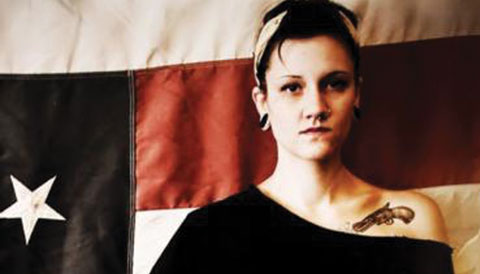
SHOWING IT “Robynn was open on a completely different level than the guys were,” Nesson says of her PTSD-afflicted subject. |
In the Bible, they beat swords into plowshares. On Martha's Vineyard on July 21, 2008, about two dozen Iraq War vets recovering from post-traumatic stress disorder shredded their old uniforms into paper and turned them into works of art.
Sara Nesson, a filmmaker with local roots (she's the stepdaughter of tire magnate Barry Steinberg), had helped organize the event, which was called the Combat Papers Project. It gave her an idea for a film: Iraq, Paper, Scissors, a profile of several of the vets who participated in the program. While shooting that picture, Nesson noticed that one of the subjects, Specialist Robynn Murray, stood out, demanding a separate movie. And so was born Nesson's "Poster Girl," which has been nominated for the Best Short Documentary Oscar. Many are tipping it to win.
"Robynn was open on a completely different level than the guys were," Nesson recalls. "The guys were really open to letting me film them doing their art. They would talk about what they had gone through or what they were going through, but they wouldn't let me film them going through the hell, and I wanted to show what the face of PTSD was, and I didn't want to just have them talk about it. Like having panic attacks or breaking down and dealing with the VA. Robynn just really let me shadow her. And that was the kind of film that I wanted to make."
The title comes from a cover picture in Army Magazine featuring Murray and two other women from her unit looking macho in full battle gear and toting guns. In fact, Murray had been assigned to a unit that was supposed to be assisting Iraqi civilians. When she arrived in Baghdad, however, she found herself in the turret of a humvee with a SAW machine gun taking sniper fire. Later, as she describes in one of the film's more harrowing moments, she was ordered to investigate at the home of a butchered Iraqi family. A lump of brain tissue on a piece of bread is one of the details that sticks with her.
But as the film points out, Murray is just one of at least 300,000 Iraq vets suffering from PTSD. "I think that number is actually really low," says Nesson. "It doesn't include how many backlogged claims there are. Those are just the people who have actually gone through the VA and processed their claims. That doesn't represent the people that are dealing with this all by themselves. It doesn't represent the number of people who have attempted suicide. Eighteen veterans commit suicide every single day. The number has way surpassed the number of soldiers who are dying in combat."
Nesson shot "Poster Girl" over a period of more than three years, recording Murray's struggles with the Veterans Administration, with debts, with a balky car, with guilt, rage, grief, and terror, and with wounds that will never heal. In the film, her story finishes better than it started, as she finds relief through art and activism.